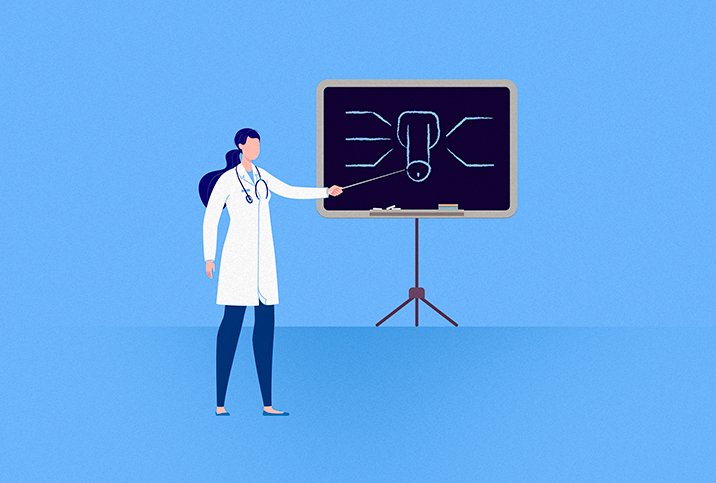Improving Penis and Testicle Health

When most men think about the health of their penis and testicles, the first thoughts may be of sexually transmitted infections (STIs), sexually transmitted diseases (STDs) and erectile dysfunction (ED). Yet myriad conditions can affect your penis and testicles. How you take care of your reproductive and sexual health is as much about what you do as what you avoid.
A medical issue with your penis or testicles can potentially be reflective of other more serious conditions and can have a negative effect on your self-confidence and overall health. Let's take a look at how best to maintain and improve your penis and testicle health.
An overview of penis and testicle health
The health of your penis and testicles goes beyond the ability to perform sexually. Problems with your penis may be signs of underlying health problems. These problems can impact other areas of your life by causing poor self-confidence, relationship challenges or stress. When you know the health conditions that can affect your genitals, you can be more proactive and knowledgeable.
Health conditions and erectile dysfunction
To keep your penis and testicles healthy, it's important to understand the health conditions that may affect sexual function. Sexual function is highly dependent on vascular health because the health of your blood vessels is intimately related to your ability to attain and maintain an erection. Heart disease, diabetes, high blood pressure and obesity all impact your blood vessels and therefore increase your risk of erectile dysfunction.
Unfortunately, many factors beyond health issues can also affect sexual function. Medications to treat high blood pressure, sleep, ulcers and antidepressants all have side effects that can negatively impact erectile function. Smoking, excessive drinking and hormonal imbalances also influence sexual performance; hormonal imbalances include testosterone deficiency or surplus, which occurs when you use steroids.
Age is also a major factor. As you grow older, your testosterone levels decrease steadily over time. Testosterone tells the brain when it's time to produce nitric oxide, a key player in achieving an erection. Low levels of testosterone can affect the strength of an erection, the intensity of orgasms and the force of ejaculation.
Erectile dysfunction can be a huge hurdle, but it's not insurmountable. Many times, ED is caused by an underlying factor, and your doctor will first focus on treating the illness. Treatment for your erectile dysfunction could include wearable devices such as Eddie by GiddyⓇ or vacuum pumps, pills, injections, surgery and others. Talk to your doctor about what's right for you.
Conditions affecting the penis and testicles
Several types of diseases and conditions affect penis and testicular health. Some conditions are congenital, which means you were born with them, and some develop over time. Congenital conditions include epispadias and hypospadias. Both are birth defects affecting the urethra, the tube carrying urine from the bladder to the outside of the body.
Other diseases and conditions include:
Peyronie's disease: Peyronie's is a condition in which scar tissue forms inside the penis. This can cause a curved penis and painful erections. The disease can progress to the point where sexual intercourse is impossible. Symptoms include curvature of the penis, pain and shortening of the penis. In some cases, it does not cause problems and may resolve itself.
Phimosis or paraphimosis: Phimosis affects uncircumcised men and causes difficulty retracting and repositioning the foreskin. Treatment can include steroid cream or, in extreme cases, circumcision.
Priapism: Priapism is an erection lasting more than four hours. This condition is painful and a medical emergency. Seek treatment immediately in an emergency room. Erections lasting longer than four hours and not relieved by orgasm can lead to permanent erectile dysfunction.
Testicular cancer: Men of any age can have testicular cancer, but most often, it occurs in men from ages 15 to 44. Symptoms include a heavy-feeling scrotum or a lump in either testicle. With early diagnosis, treatment is often successful.
Penile cancer: This disease, though incredibly rare, occurs when cancer cells form in the penis tissue. The first sign of penile cancer is usually a blister on the foreskin, so regular penis inspection is important in detecting it early.
Natural approaches to penis and testicle health
You can take several steps to improve the health of your penis and testicles, and protect your sexual function and overall health. Some steps can also reduce your risk of acquiring underlying medical conditions that may also affect your sexual health. While these may seem like small steps, they can have a large impact on your sexual performance and health.
Nutrition and exercise
It's important to stay hydrated for the sake of your overall health and the health of your blood vessels. Dehydration can lead to the release of angiotensin II. This is a hormone that helps control blood pressure but can be dangerous if unbalanced. High blood pressure can raise the risk of erectile dysfunction. It is difficult to recommend the amount of water you should drink each day since many of the foods you eat also contain fluid. Instead, pay attention to the color of your urine. Urine should be a light straw color when you are well hydrated.
Eating a well-balanced diet low in processed foods and carbohydrates helps reduce the chances of developing heart disease or type 2 diabetes. These health conditions affect your blood vessels and therefore increase your risk of ED. One study published in 2016 in the American Journal of Clinical Nutrition evaluated dietary flavonoids and the incidence of erectile dysfunction in men who ingested them. They found flavonoid-rich foods help reduce the incidence of ED.
A healthy diet can also positively impact your prostate health and sperm count. Lean proteins and leafy greens can help keep your prostate healthy, and one study indicated coffee can actually lower the risk of prostate cancer. Fish containing healthy fats and higher concentrations of fruits and vegetables may lead to higher sperm count.
Getting moderate amounts of physical activity daily can also help reduce your chances of erectile dysfunction and keep your sperm healthy. Exercise also helps control your weight and reduce your potential risk of heart disease and type 2 diabetes. Even a daily brisk walk can have an impact on your health. Talk to your doctor before starting any exercise regimen and start slow if you're new to working out.
Hygiene
Balanitis is an inflammation of the head of the penis that occurs in uncircumcised men. The foreskin becomes inflamed and can cause swelling and itching, a rash, pain and a strong-smelling discharge. The most common cause is poor hygiene. Bacteria, sweat and debris can build up around the tip of the penis and trigger an inflammatory response and infection.
While all men should clean their penis daily, it's especially important for uncircumcised men. Start by pulling the foreskin back and clean under the foreskin with warm, soapy water. Be sure to rinse thoroughly before pulling the foreskin back over the penis.
Stress, sleep and alcohol
Stress, insufficient sleep and excessive alcohol each has a significant impact on your overall health and the health of your penis and testicles. Stress and anxiety can affect sexual performance and increase the risk of cardiovascular disease. Seek stress management techniques that work for you. These may include deep breathing, meditation and exercise. If stress is overwhelming your life, consider seeing a therapist who can give you strategies for managing your stress levels and overall mental health.
Insufficient amounts of sleep, due to either poor sleep hygiene or sleep apnea, harm sexual function. Obstructive sleep apnea is associated with erectile dysfunction. A study published in 2019 by the Physiological Society found habitual short amounts of sleep altered vascular function and, therefore, could affect ED. Improving sleep quality may help you improve sexual function.
Poor sexual performance is also associated with alcohol and tobacco use. Cigarette smoking disrupts the heart's autonomic function and impacts vascular health. Excessive drinking can also have a deleterious effect on sexual performance.
Testicular self-examination (TSE)
Testicular self-examination is something you can do at home to check up on your testicle health, and regular self-exams may help find testicular cancer at an early stage. A lump in the testicle is often one of the first symptoms. Most doctors recommend a testicular exam as part of a yearly physical examination. Some recommend regular self-exams every month after puberty, especially for men with a family history of testicular cancer.
The best time to perform a testicular self-exam is after a warm shower or bath when your genitals are clean and the skin is soft. You'll want to cup each testicle, one at a time, and roll the testicle between your thumb and fingers, using slight pressure. While it's completely normal to have one testicle larger than the other, you should feel for any lumps or change in size or regularity. If anything feels off to you, or you're not sure, consult your doctor.
Preventing STI/STDs
STIs and STDs have a significant impact on your penis and testicle health, as well as your overall health. Some STDs, such as syphilis, can be fatal if left untreated. The Centers for Disease Control and Prevention (CDC) recommends taking control of your sexual health and practicing strategies that reduce your risk.
These strategies include reducing the number of sexual partners and using protection. Correct and consistent use of a condom can help reduce the transmission of STDs. It's also important for you and your partner(s) to be regularly tested for STDs. This helps reduce the spread of infection and reduces your risk.
When to see a doctor
Signs and symptoms of penis and testicle issues vary by condition. Take care to visually inspect your genitals regularly, which will help you recognize when something is different. It is important to see your doctor anytime you notice a difference in what you feel, see or experience in your sexual health. Physical signs that something is wrong can include:
- Pain during sex
- Changes in orgasm or ejaculation
- Pain or a bend in your penis
- Painful, itchy rash on your penis
- Discharge from your penis
- Burning when you urinate
- Problems getting or keeping an erection
- Blisters, warts, sores or bumps on your penis
- Bleeding when you urinate or ejaculate
- Changes in the size or shape of your testicles
- Pain in the scrotum
- Finding a lump in the scrotum
If you're not sure, see a doctor. It's important to detect problems early before any long-term damage can be done. A professional examination is the only way to be sure if something is wrong.
Outlook
Advances in medical technology and treatments have created a positive outlook for men diagnosed with penile or testicular illnesses. Even a diagnosis of testicular cancer is very treatable. When found early and treated effectively, the outlook is good for erectile dysfunction and many of the underlying medical conditions that affect penis and testicular health.
However, ignoring symptoms allows a condition to progress and become more difficult to treat. In some cases, without treatment, the condition can become permanent or fatal. It is crucial to recognize when something is different and seek medical care to improve your health outcome.


















